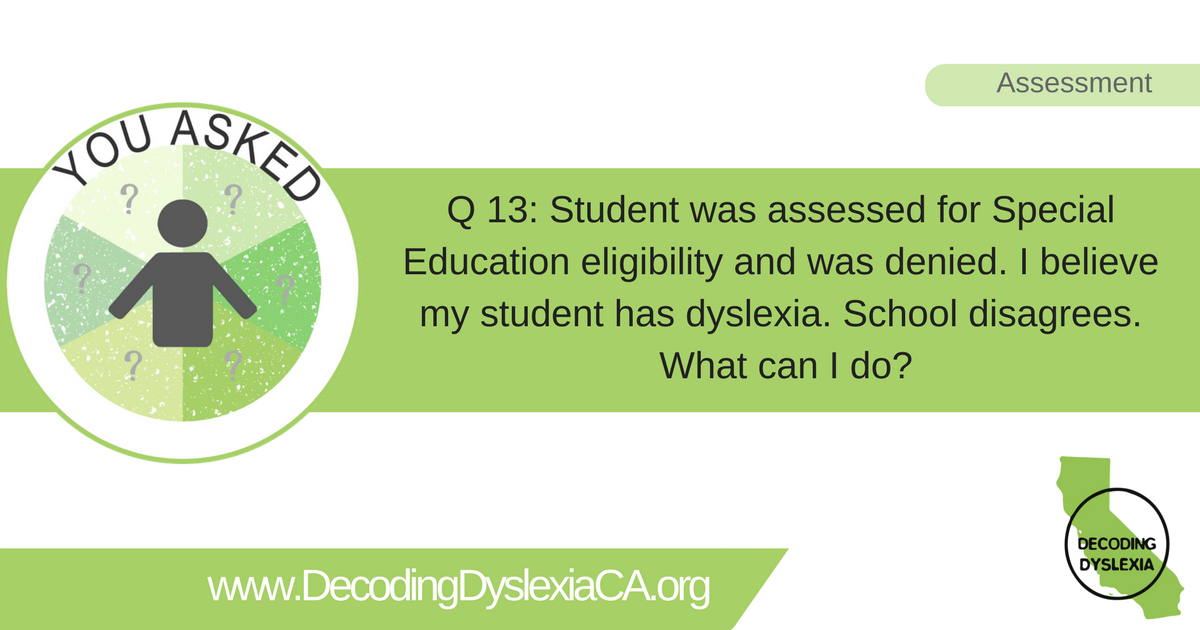Download a PDF version of this You Asked question and answer here.
Q13: Student was assessed for Special Education eligibility and was denied. I believe my student has dyslexia. School disagrees. What can I do?
A: Independent Educational Evaluation (IEE) at District’s Expense: If you disagree with a school district’s assessment, you must specifically ask the district to pay for an independent educational evaluation (IEE). It is very important that you specifically state that you are requesting an IEE and that you are in disagreement with the District’s assessment. You are not required to specify why you are in disagreement unless you choose to do so. A template IEE letter can be found at https://dredf.org/special-education/sample-letters/
When the school district receives your request for an IEE, the school district has only two options: Fund or File. That is, the district must either pay for the independent evaluation (Fund) or file for Due Process (File), claiming that the district assessment is “appropriate.” If the district decides to go to a hearing, and the hearing officer determines that the school’s evaluation is appropriate, you have a right to the independent evaluation, but not at public expense (34 C.F.R. Sec. 300.502; Cal. Ed. Code Sec. 56329(b)). The district may ask you to identify specific areas of disagreement with its evaluation, but this cannot be used to delay the district’s response to your request (34 C.F.R. 502(b); Cal. Ed. Code Secs. 56329(b) & (c)).
Under federal regulations, the district must respond to your request for an IEE “without unnecessary delay” (34 C.F.R. Sec. 300.502(b)(2)). Under current California case law, “unnecessary delay” has been found to be more than ninety days (Pajaro Valley Unified Sch. Dist. v. J.S., 47 IDELR 12, 50 (N.D. Cal. 2006)). If the district fails to respond by either paying or filing for due process, it has failed to comply with the law. You could file a compliance complaint to ask the CDE to determine whether the school district should fund an IEE under those circumstances.
Note: A parent does not need to choose an evaluator from a school district list. However, a school district may need to know more about evaluator(s) you select, in order to determine whether he/she meets the qualifications to administer the IEEs. If an evaluator the parent selects does not meet district criteria, parents must be given full opportunity to explain/request why this person, with this particular expertise is necessary to conduct the IEE. Determinations must be made on an individualized, case-by-case, basis. Please refer to the attached Wrightslaw article on “Independent Educational Evaluations: Must Parents Choose an Evaluator from School’s Approved List?”
Independent Educational Evaluation (IEE) at Your Expense: You can always obtain and independent educational evaluation (IEE) at your own expense and the school district must consider the results of an independent evaluation in any decision regarding the provision of a free appropriate public education to your child. The results may also be presented as evidence at a due process hearing (34 C.F.R. Sec. 300.502(c); Cal. Ed. Code Sec. 56329(c)).
Once you have obtained the IEE and are satisfied with it, provide a copy to the school district and request an IEP meeting to review the assessment. You should inform the district in writing of the recommended services or placement in the IEE that you are requesting for your child. This will allow the district time to provide you with “prior written notice” if the district refuses to provide the services or placement recommended in the IEE.
Also, be sure to let the school district know that you want someone to attend the IEP meeting who is authorized to respond to the IEE on behalf of the school district. You are responsible for paying for an assessment that you have obtained on your own, unless the district has agreed to fund it. However, if the district accepts the recommendations made in this assessment, you may be able to seek reimbursement from the school district. (Source: Special Education Rights & Responsibilities by Community Alliance for Special Education and Disability Rights of California, pages 2-16 through 2-19 http://www.disabilityrightsca.org/pubs/PublicationsSERREnglish.htm)
An excellent article regarding IEEs can be found here: https://decodingdyslexiaca.org/wp-content/uploads/2017/03/547601-1.pdf
For more YOU ASKED questions and answers click HERE


